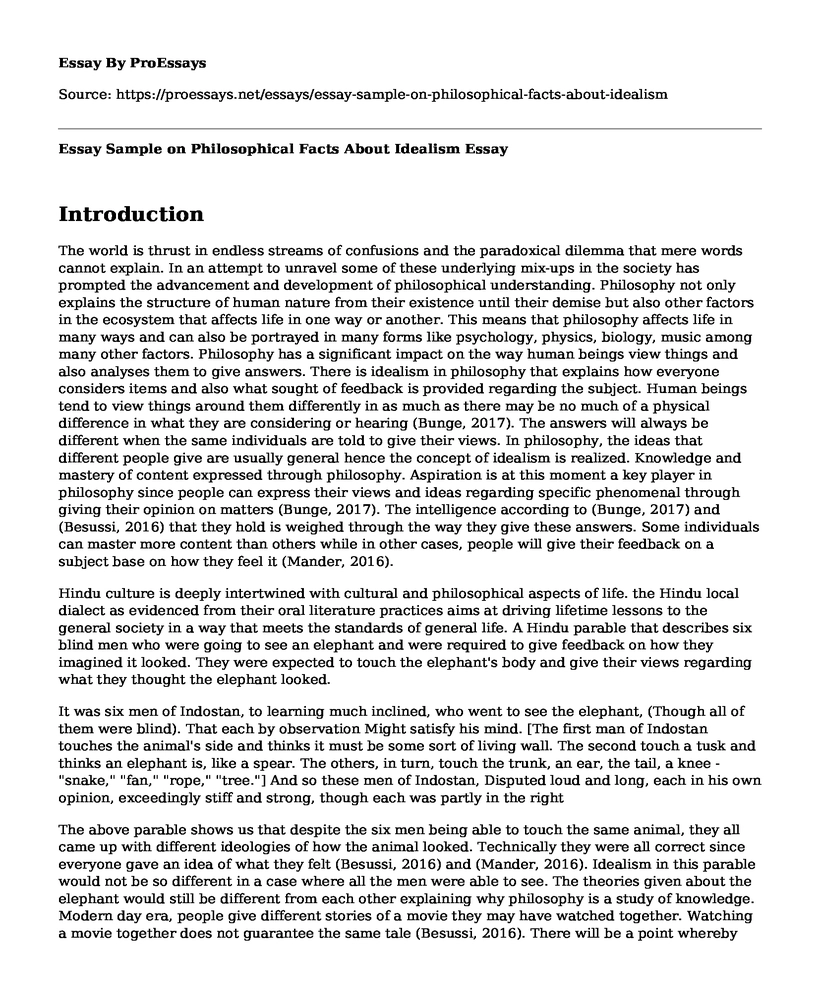Introduction
The world is thrust in endless streams of confusions and the paradoxical dilemma that mere words cannot explain. In an attempt to unravel some of these underlying mix-ups in the society has prompted the advancement and development of philosophical understanding. Philosophy not only explains the structure of human nature from their existence until their demise but also other factors in the ecosystem that affects life in one way or another. This means that philosophy affects life in many ways and can also be portrayed in many forms like psychology, physics, biology, music among many other factors. Philosophy has a significant impact on the way human beings view things and also analyses them to give answers. There is idealism in philosophy that explains how everyone considers items and also what sought of feedback is provided regarding the subject. Human beings tend to view things around them differently in as much as there may be no much of a physical difference in what they are considering or hearing (Bunge, 2017). The answers will always be different when the same individuals are told to give their views. In philosophy, the ideas that different people give are usually general hence the concept of idealism is realized. Knowledge and mastery of content expressed through philosophy. Aspiration is at this moment a key player in philosophy since people can express their views and ideas regarding specific phenomenal through giving their opinion on matters (Bunge, 2017). The intelligence according to (Bunge, 2017) and (Besussi, 2016) that they hold is weighed through the way they give these answers. Some individuals can master more content than others while in other cases, people will give their feedback on a subject base on how they feel it (Mander, 2016).
Hindu culture is deeply intertwined with cultural and philosophical aspects of life. the Hindu local dialect as evidenced from their oral literature practices aims at driving lifetime lessons to the general society in a way that meets the standards of general life. A Hindu parable that describes six blind men who were going to see an elephant and were required to give feedback on how they imagined it looked. They were expected to touch the elephant's body and give their views regarding what they thought the elephant looked.
It was six men of Indostan, to learning much inclined, who went to see the elephant, (Though all of them were blind). That each by observation Might satisfy his mind. [The first man of Indostan touches the animal's side and thinks it must be some sort of living wall. The second touch a tusk and thinks an elephant is, like a spear. The others, in turn, touch the trunk, an ear, the tail, a knee - "snake," "fan," "rope," "tree."] And so these men of Indostan, Disputed loud and long, each in his own opinion, exceedingly stiff and strong, though each was partly in the right
The above parable shows us that despite the six men being able to touch the same animal, they all came up with different ideologies of how the animal looked. Technically they were all correct since everyone gave an idea of what they felt (Besussi, 2016) and (Mander, 2016). Idealism in this parable would not be so different in a case where all the men were able to see. The theories given about the elephant would still be different from each other explaining why philosophy is a study of knowledge. Modern day era, people give different stories of a movie they may have watched together. Watching a movie together does not guarantee the same tale (Besussi, 2016). There will be a point whereby they will differ regarding certain scenes even when the scenes repeated. People are inclined to giving their theories regardless of what they have in common. Students give different answers in an exam despite having been taught the same classroom by the same teacher - the students' scores differently from each other. A British writer by the name James Jean tries to argue with himself whereby one part of him supports that scientific facts run the universe while the other says that a supreme being controls the world.
The universe seems to me to be nearer to a great thought than to a great machine. It may well be, it seems to me, that each individual consciousness ought to be compared to a brain-cell in a universal mind. (James Jeans)
Conclusion
In conclusion, it is appropriate to say that philosophy has and will always be a key player in our modern day lives. The above discussion shows us that idealism being a part of philosophy affects us as human beings. The way different people give opinions regarding a subject that they have all witnessed in common is a crucial player. Knowledge of a person weighed through the way one answers questions regarding the topic at hand. Idealism as a subject in philosophy answers the question of why people give different answers regarding the same situation.
References
Bunge, M. (2017). Political philosophy: Fact, fiction, and vision. Routledge.
Besussi, A. (Ed.). (2016). A Companion to Political Philosophy. Methods, Tools, Topics. Routledge.
Mander, W. J. (2016). Idealist ethics. Oxford University Press.
Cite this page
Essay Sample on Philosophical Facts About Idealism. (2022, Dec 02). Retrieved from https://proessays.net/essays/essay-sample-on-philosophical-facts-about-idealism
If you are the original author of this essay and no longer wish to have it published on the ProEssays website, please click below to request its removal:
- Assessment of a Goodlife Essay
- Ethics Review: Bioethicists and Ethical Principles Paper Example
- Essay Sample on Explaining the Enduring Resonance of the Hart-Fuller Debate
- Essay Sample on Living a Life of Examined Meaning: Socrates' Wisdom
- Critical Thinking Case Study: Kantian Ethics
- Social Work Code of Ethics: The NASW Standards of Professional Conduct - Essay Sample
- Paper Example on Economics: Does It Encourage or Discourage Moral Virtue?







